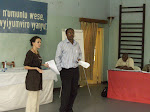Dear all,
Children of Malakal Primary SchoolWe have now been back in Sudan nearly 3 weeks, Here’s the news:
Malakal Diocese
We arrived in Malakal to amazingly cool weather, at only 35 degrees we were very happy, however within in few days the temperature shot up to its normal March time heat of 45 degrees which I find very hard to sleep in. We stayed with a lovely family who let us use their guest tukul (mud hut) which was a real blessing as accommodation in Malakal is crazily high! (there are two hotels, one is a series of tents you can stay in – up to $200 a night! due to UN inflation (Malakal is one of the UN sectors for South Sudan with many UN agencies basing themselves here as well as over 2000 UN Peacekeeping troops).
The family we stayed with were also hosting a YWAM (Youth With A Mission) team who really hadn’t been looking after themselves properly (sleeping without mosquito nets and drinking river water rather than filtering it) consequently 3 of them had become seriously ill with Malaria, Ecoli and Jardia. However all 3 after some very heavy medication
New Schools Project
At the end of last year we helped the Diocese write a new proposal to Christian Aid for 2008, their proposal was approved just before Christmas which means they will receive further funds for their school building work. This year they will be building 4 extra classrooms at 3 of the schools and providing fences, verandas, guttering and water tanks for all 5 schools in the Diocese.
This is one of the 5 schools in a town called Khorfulus. Unfortunately in February there was some heavy fighting in town between the SPLA (Sudan Peoples Liberation Army) and the Police causing many people to flee. The situation has calmed down and we hope will remain so that the school will be able to open at the beginning of term (School in South Sudan runs from April to December). As you can see from the picture this school currently has 2 classrooms, 164 children are being taught here and the 65 in the kindergarten are taught under a nearby tree. One new classroom will be built here, verandas around the building will help to shade children during break times and protect the mud walls during the heavy rains. This area receives up to 5 months a year of rain so guttering and a large water tank will be installed to enable them to have water on site for drinking and cooking. Although this doesn’t deal with the whole problem of water it’s a start. We hope to find some funding for the diocese to be able to buy water filters so that whether collecting rain or Nile water, the children will be able to start drinking clean water.
We are not here for the whole year this time, we are just visiting to assist the diocese at key points during the new project. They are currently at the point of project start up, so we have been giving some follow up training to the Project Management training of last year focusing in on the implementation phase. Things like reviewing the project time line and budget, project governance structure, recruitment, procurement, staff role clarity and project monitoring.
The Diocese have a development committee which will be responsible for overseeing the building project. Last year everyone who worked on the project was a volunteer. However this year there will be money to pay for a Project Manager, an Education Co-ordinator and a part time book keeper. We have been helping to write the job descriptions for these posts. This is the first time anyone has heard of a job descriptions let alone had one and the committee got quite nervous about the idea. There will be no recruitment process this year but we will spent time discussing recruitment processes in the hope that for their next project they will start to feel comfortable with the idea and have the tools to administer it.
Mothers Union Worker
Me with key members of Malakal’s MU. The Bishops wife Rebecca is in blue on my right.
Parishes, gathering and encouraging women in their prayer and bible studies.At the end of last year the Mothers Union of the Diocese actually held the first ever interviews for a Diocesan role very successfully and appointed Rebecca Ator Yor (pictured here) as the first Mothers Union Worker for the Diocese. She will be paid by the Mothers Union UK which will enable her to be full time. She will be visiting the Rebecca herself is a trained nurse who worked with the army throughout the civil war. Now she plans to organise health and hygiene workshops for women in the Diocese. Among many other things Rebecca plans to give much needed support to the many parish kindergartens in the diocese, she will visit them, meet with parents and encourage them to pay school fees for the teachers many of whom are volunteers and struggling to survive, she’ll organise community fundraising for classrooms and apply for and oversee school feeding programmes. The hut pictured above is one of the Parish kindergartens, 60 children currently attend here and this is likely to increase when the new term begins – Rebecca is helping the parish fundraise for a second classroom.
That’s all for now, we have another week in Sudan before we travel to Burundi where we will be spending a week with the Anglican Church giving some assistance with their school building work. Will be in touch again soon,
Best wishes
Keren & Simon xx
.JPG)








